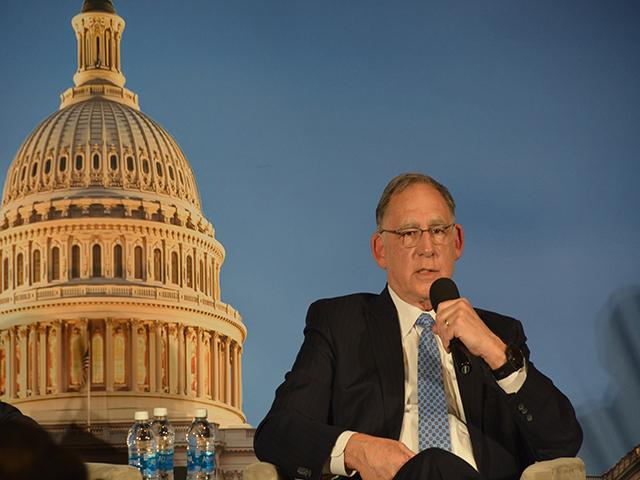Ag Policy Blog
Senate Ag Leaders Hold Out Hope for a Farm Bill in 2024
WASHINGTON, (DTN) -- The crowd Monday at the Agri-Pulse Ag & Food Summit was a collection of who's who in the capital ag policy space.
When polled early in the event held at the National Press Club, participants were asked if they thought Congress would pass a farm bill in 2024. The response was more than 80% no.
Later in the day, Sen. John Boozman, R-Ark., ranking member of the Senate Agriculture Committee, was told the numbers and asked if they were wrong.
"I hope they are because I know farmers need the stability," Boozman said. He added that both members of both parties still support getting a farm bill done in 2024. "If you talk to the average person in Congress, most members of Congress very much want to get a farm bill done -- on both sides."
The senator disagreed with an audience question that Republicans don't want to pass a five-year farm bill that could be viewed as helping President Joe Biden in the presidential race.
"I don't believe that at all. I believe it's a misstatement," Boozman said.
While Congress may be evenly split, Boozman made the case Republicans would benefit with the rural vote this year by passing a farm bill.
"When you look at Republicans, farmland is pretty heavily in their favor," Boozman said.
P[L1] D[0x0] M[300x250] OOP[F] ADUNIT[] T[]
Rural America also needs a healthy economy. "That's why it's so important to get a farm bill done," Boozman said.
Boozman later told DTN that the Senate Agriculture Committee expects to work on a bill, but follow the House of Representatives. The senator said he was confident the House would act this spring.
Shortly later, Senate Agriculture Committee Chairwoman Debbie Stabenow, D-Mich., offered the group of lobbyists in the room representing nearly every aspect of the farm bill to keep the agriculture-nutrition coalition together to pass a bill. In other words, don't try to take money from one area of the farm bill to pay for another.
"If we abandon the coalition, we don't get a farm bill," Stabenow said. She added, "I believe we are going to get a farm bill by building coalitions."
Having worked on six farm bills, and helped lead three, Stabenow stressed she's not going to leave her legacy in her final farm bill by taking money away from nutrition aid. Democrats in Congress also simply aren't going to support that.
Stabenow noted, "The same fights come up every time, every time, every single time and they never work." She added, "What does not work is playing politics with food and nutrition against everything else in the farm bill," she said.
The senator then stressed, "I will not have my legacy cutting food assistance from Americans."
The missing element Monday were members of the House Agriculture Committee, who were not there to offer their take on the prospects of a 2024 farm bill.
Separately, Agriculture Secretary Tom Vilsack's comments were again interrupted by a small group of protestors calling on the secretary to "stop the bird-flu bailout." The same people disrupted Vilsack at the USDA Agricultural Outlook Forum in February. They don't say who they are with, and they don't have solutions to dealing with highly-pathogenic avian influenza. They just seem to want USDA to stop its obligations to limit a foreign animal disease.
In his talk, Vilsack took on the challenge of the agricultural trade imbalance. This year, that trade imbalance could hit $30 billion. The secretary said several factors are driving that.
"We do have a stronger economy," he said. "They don't have quite the demand in the rest of the world so they are looking for markets."
Looking at the difference, he said the U.S. is importing a lot of horticulture and increasing imports of products such as sugar, indicating that would help with food inflation. "Do we want to keep food prices down?"
The secretary also said the Biden administration is reducing tariffs on some key products and continues to litigate over biotechnology in Mexico and dairy access to Canada. He also pushed back on Congress, saying lawmakers have not passed any fast-tract trade authority to allow for free-trade agreements.
"Did I miss it? Have you passed fast-track authority?"
Chris Clayton can be reached at Chris.Clayton@dtn.com
Follow him on X, formerly known as Twitter, @ChrisClaytonDTN
(c) Copyright 2024 DTN, LLC. All rights reserved.






Comments
To comment, please Log In or Join our Community .